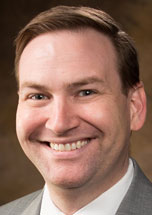
Northwest Arkansas prides itself on its support for entrepreneurs across the business lifecycle, and the University of Arkansas is a key pillar of that support. And rightly so, with resources such as the Office of Entrepreneurship and Innovation’s Brewer Family Entrepreneurship Hub, the Small Business and Technology Development Center, accelerators and incubators, such as the Greenhouse Outdoor Recreation Program, and entrepreneurship programs that rank amongst the best in the nation. One of the newest additions to these programs is the Founder Development Initiative, led by Oleg Petrenko, Associate Professor of Strategy, Entrepreneurship, and Venture Innovation.
The Founder Development Initiative grew organically from another program that Petrenko was leading with a venture capital firm in Tulsa and the founders in whose firms they invested. That leadership development program focused on improving founders’ resilience, grit, and coachability. Venture capital firms look for these qualities in founders because they are effective predictors of long-term success.
This program garnered much positive feedback, but one piece of feedback planted a seed in Petrenko’s mind: “one of the interesting findings we had was that every single one of them said, ‘I wish a program like this was available to us earlier, when we just started the journey. All those hard lessons we had to go through – this type of program would have been really helpful [before the seed funding stage].”
And from that, the Founder Development Initiative – a multifaceted program that focuses on the psychology and personality of founders – was born. Unlike executives at a large firm, founders “are the firm,” as Petrenko states. “That connection is so much more direct and so much more intense.... founders and their personality affect every single aspect of the way the firm is growing, the way their firm is operating, the way they’re raising funds and every single aspect of it.”
To complement his science and academia lens, Petrenko recently added a reputable founder from the Northwest Arkansas region to his team. Elizabeth Prenger is a founder in the femtech industry and has led the development of multiple founder-focused initiatives and women’s health innovation programs. Prenger brings a founder’s perspective to the growth of the Founder Development Initiative. “As someone who has personally experienced the extreme highs and lows of being a solo-founder,” Prenger explains, “I immediately saw the inherent value in supporting founders in this way. It’s especially critical for underserved founders who don’t fit the traditional mold of the venture-backed ecosystem.”
As noted above, the region has an abundance of resources that focus on the technical and analytical skills founders need, but a gap exists in helping founders improve their psychological resilience. And the Founder Development Initiative endeavors to fill that gap and raise awareness of the importance of psychological resilience, grit, and coachability in the early stages of a product or business’s lifecycle.
Creating Connections among Founders
One of Petrenko’s goals in this project was to ensure that founders have the skills needed to develop psychological resilience. Founding a company can be a lonely profession despite the widely held notion that these people already come equipped with strong social networks and self-awareness. Petrenko acknowledges that when a company is successful, founders are “on top of the world,” but when faced with significant challenges or losses, the founder can enter a “dark place.” These extreme swings of an individual founder’s experience prove isolating, and without a support network of peers, can negatively affect the founder’s well-being.
While each founder is unique and backgrounds vary widely, most will eventually encounter similar experiences and problems as they build their companies. Petrenko notes that sharing these experiences with each other in a guided space can “help them with this idea of depression or loneliness, some of the issues of mental health, and to really increase their resilience in terms of their psychology.” By recruiting founders in the Northwest Arkansas and Southwest Missouri area for this first cohort, the program creates a community of founders who can support each other through the challenges of creating a business. Additionally, it creates a network of peers who can help others navigate similar issues that arise within their region.
However, to meaningfully create relationships with other founders, cohort members must have a strong understanding of their own personality, values and motivations. Petrenko’s previous research overwhelmingly supports the theory that CEO personalities affect the way their firms operate and how they are perceived by stakeholders. Successful executives and founders unsurprisingly don’t fall into the average ranges in assessments, such as the Big 5, which means they might not always be readily understood by outsiders.
Petrenko’s goal is to help cohort members create strategies to develop self-awareness. The goal is not to change their personality but to understand their strengths, weaknesses, and how they deal with stress. Cohort members can then learn strategies to negate the negative effects of stressful situations that they might face.
Driving Future Research
The realization that founders tend to possess atypical personality traits fuels the second goal of the Founder Development Initiative: to produce a body of knowledge to fill a research gap that exists in the realm of entrepreneurship and psychology.
Petrenko explains that his familiarity with executive psychology inspired his curiosity with that of entrepreneurial psychology. While researching executives over the past decade, Petrenko has assessed how executives make decisions and how they ultimately shape the performance of their firms. This research benefits all stakeholders, from the executives themselves to investors, and can provide much needed insight and guidance into how a company is managed.
Unfortunately, the lack of research on entrepreneurship limits how successful academic programs, accelerators, and VC firms can be in their attempts to support a founder during a firm’s earliest stages. Petrenko believes that the Founder Development Initiative can inform and help him “produce the type of research that can be used in creating this body of knowledge that can be applied to different areas of entrepreneurship.”
In order to fulfill the duel needs of supporting founders and providing data for Petrenko’s future research, the program requires that cohort members take personality assessments, participate in discussion sessions, and complete homework. Not only does this create a stream of data for Petrenko and his colleagues to use for their research, but these activities also help hold participants accountable to the program, their peers, their firms, and to themselves.
Regional Benefits
The Northwest Arkansas region has experienced explosive population growth over the past decade, and experts foresee that the area will hit a million people before 2045. This growth, despite causing possible infrastructure headaches, creates more opportunities for entrepreneurs who might identify a need within the community that hasn’t yet been addressed.
The growing diversity of Northwest Arkansas is reflected in the increase of Black-owned, Latino-owned, and women-owned businesses in the area, and, while work needs to be done to ensure that these founders receive the support they need for long-term success, programs like the Founder Development Initiative can make a difference. This support has never been more needed, as Arkansas routinely ranks in the bottom 10% for women-owned businesses.
Lest we forget, Sam Walton, John W. Tyson, and J.B. Hunt were founders too. Petrenko hopes that this project will help “promote the entrepreneurial spirit” for the next generation of founders in Arkansas.
 Sarah Luhtanen serves as the Lead Editorial Assistant for Walton Insights. Following
a fourteen-year career in public education, she continues to focus on teaching, public
service, and advocacy by advising local political campaigns. Through this work, she
hopes to increase political participation and civic engagement among women and underrepresented
communities. Sarah received her B.A. in journalism and English and M.A.T. from the
University of Arkansas. She is also a member of the fourth cohort of the LBJ Women’s
Campaign School at the University of Texas at Austin.
Sarah Luhtanen serves as the Lead Editorial Assistant for Walton Insights. Following
a fourteen-year career in public education, she continues to focus on teaching, public
service, and advocacy by advising local political campaigns. Through this work, she
hopes to increase political participation and civic engagement among women and underrepresented
communities. Sarah received her B.A. in journalism and English and M.A.T. from the
University of Arkansas. She is also a member of the fourth cohort of the LBJ Women’s
Campaign School at the University of Texas at Austin.




